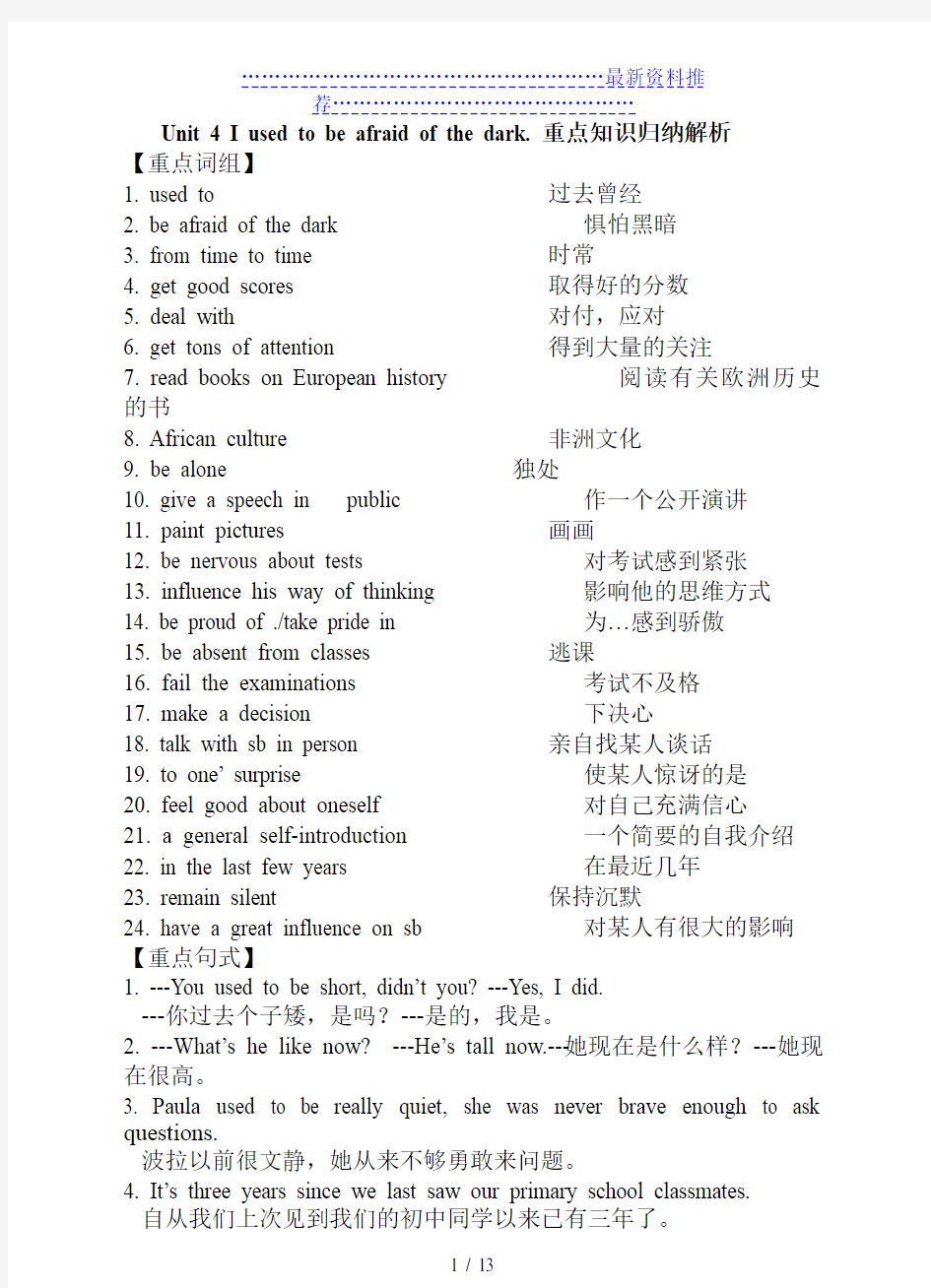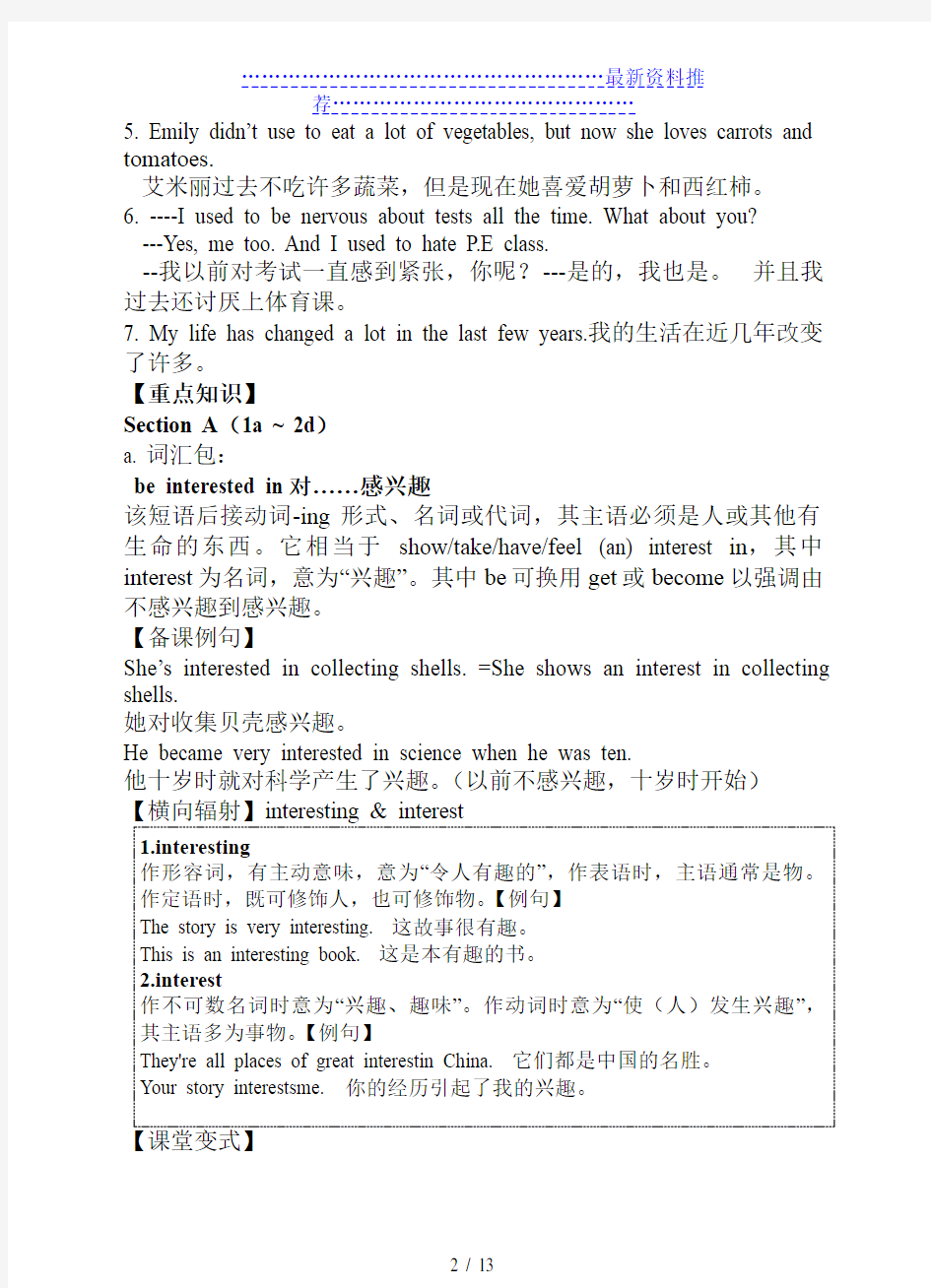人教版新目标九年级英语Unit4知识点


Unit 4 I used to be afraid of the dark. 重点知识归纳解析
【重点词组】
1. used to过去曾经
2. be afraid of the dark惧怕黑暗
3. from time to time时常
4. get good scores取得好的分数
5. deal with对付,应对
6. get tons of attention得到大量的关注
7. read books on European history阅读有关欧洲历史的书
8. African culture非洲文化
9. be alone独处
10. give a speech in public作一个公开演讲
11. paint pictures画画
12. be nervous about tests 对考试感到紧张
13. influence his way of thinking影响他的思维方式
14. be proud of ./take pride in 为…感到骄傲
15. be absent from classes逃课
16. fail the examinations考试不及格
17. make a decision下决心
18. talk with sb in person 亲自找某人谈话
19. to one’ surprise使某人惊讶的是
20. feel good about oneself对自己充满信心
21. a general self-introduction一个简要的自我介绍
22. in the last few years在最近几年
23. remain silent 保持沉默
24. have a great influence on sb对某人有很大的影响【重点句式】
1. ---You used to be short, didn’t you? ---Yes, I did.
---你过去个子矮,是吗?---是的,我是。
2. ---What’s he like now? ---He’s tall now.---她现在是什么样?---她现在很高。
3. Paula used to be really quiet, she was never brave enough to ask questions.
波拉以前很文静,她从来不够勇敢来问题。
4. It’s three years since we last saw our primary school classmates.
自从我们上次见到我们的初中同学以来已有三年了。
5. Emily didn’t use to eat a lot of vegetables, but now she loves carrots and tomatoes.
艾米丽过去不吃许多蔬菜,但是现在她喜爱胡萝卜和西红柿。
6. ----I used to be nervous about tests all the time. What about you?
---Yes, me too. And I used to hate P.E class.
--我以前对考试一直感到紧张,你呢?---是的,我也是。并且我过去还讨厌上体育课。
7. My life has changed a lot in the last few years.我的生活在近几年改变了许多。
【重点知识】
Section A(1a ~ 2d)
a. 词汇包:
be interested in对……感兴趣
该短语后接动词-ing形式、名词或代词,其主语必须是人或其他有生命的东西。它相当于show/take/have/feel (an) interest in,其中interest为名词,意为“兴趣”。其中be可换用get或become以强调由不感兴趣到感兴趣。
【备课例句】
She’s interested in collecting shells. =She shows an interest in collecting shells.
她对收集贝壳感兴趣。
He became very interested in science when he was ten.
他十岁时就对科学产生了兴趣。(以前不感兴趣,十岁时开始)
1.Mario, you used to be short, didn’t you? 马里奥,你过去很矮,对吗?
used to do sth 意为“过去常常做某事”,特指在过去经常发生的动作,而现在已不再发生,其中used to可以看作情态动词,用于各种人称。
【备课例句】
He used to play soccer when he was young. 他年轻时经常踢足球。(现在不踢了)
She used to be an English teacher. 她过去是一位英语老师。(现在不是英语老师了)
1.其否定句为didn’t use to do或used not to do,used not可缩写为usedn’t。
【备课例句】
Mr. Li didn’t use to drink beer. =Mr. Li usedn’t to drink beer. 李先生不常喝啤酒。
https://www.360docs.net/doc/f09711465.html,ed to 的疑问句形式是“Did…use to do?”或“Used…to do”。
【备课例句】
Did she use to get up early?=Used he to get up early? 她过去经常早起吗?
https://www.360docs.net/doc/f09711465.html,ed to 的反意疑问句也用助动词did(n’t)或used(n’t)构成。
【备课例句】
Mario used to be late for school, didn’t/usedn’t he? 马里奥以前上学经常迟到,对不对?
【横向辐射】be used to do sth & be used to doing sth.
子?
What does sb look like? 只用来询问某人的外貌长相,相当于What is sb like?, like在句中作介词,意为“像”。
【备课例句】
—What does Tom look like? (=What is Tom like?) 汤姆长得什么模样?—He is very much like his father, tall and dark. 他非常像他的父亲又高又黑。
【横向辐射】What is sb/ sth like?& What does sb like?
